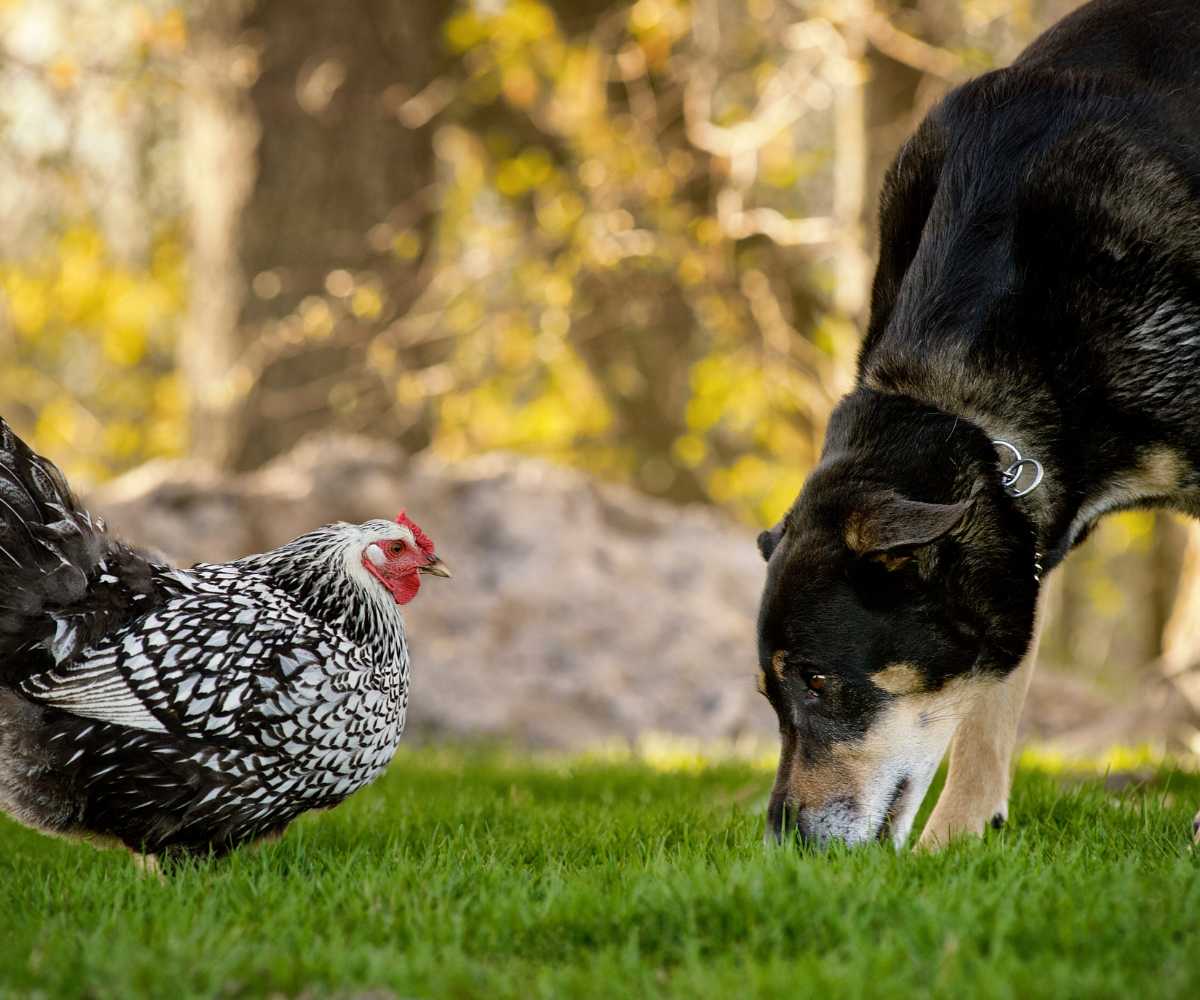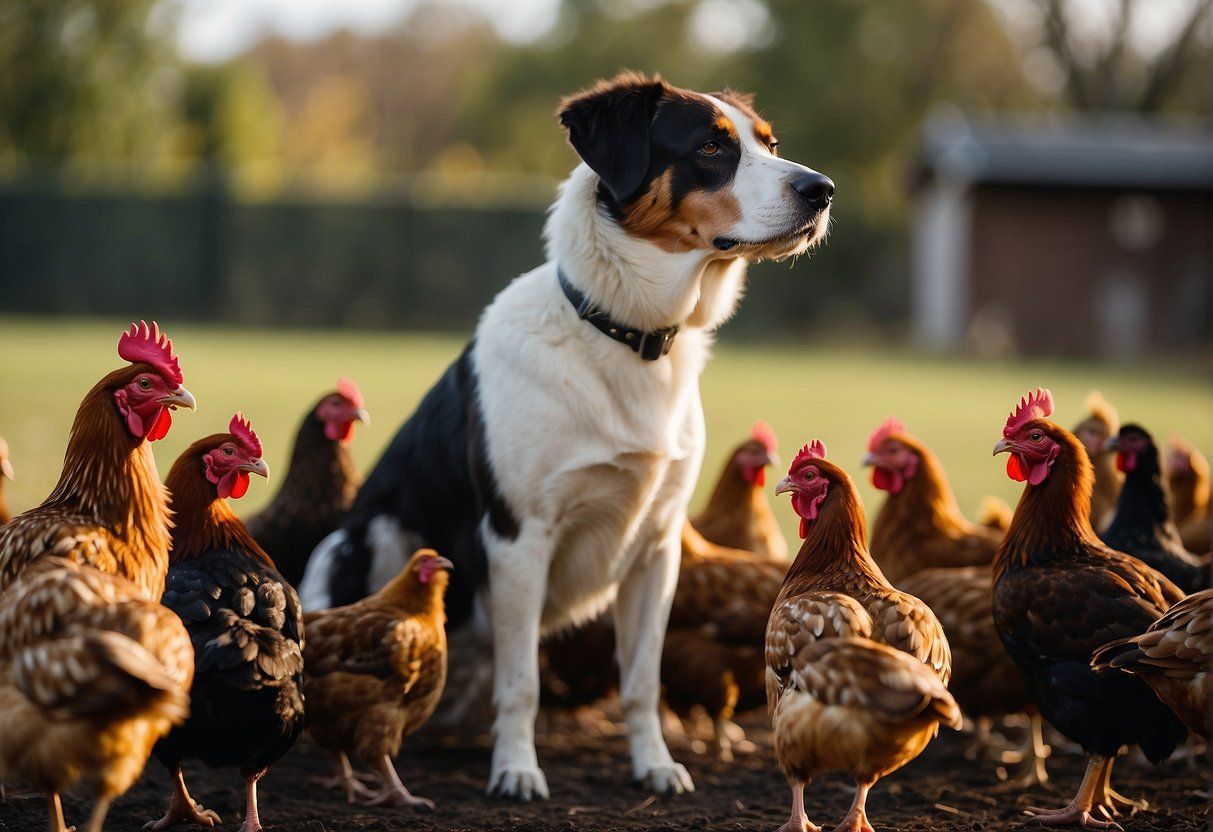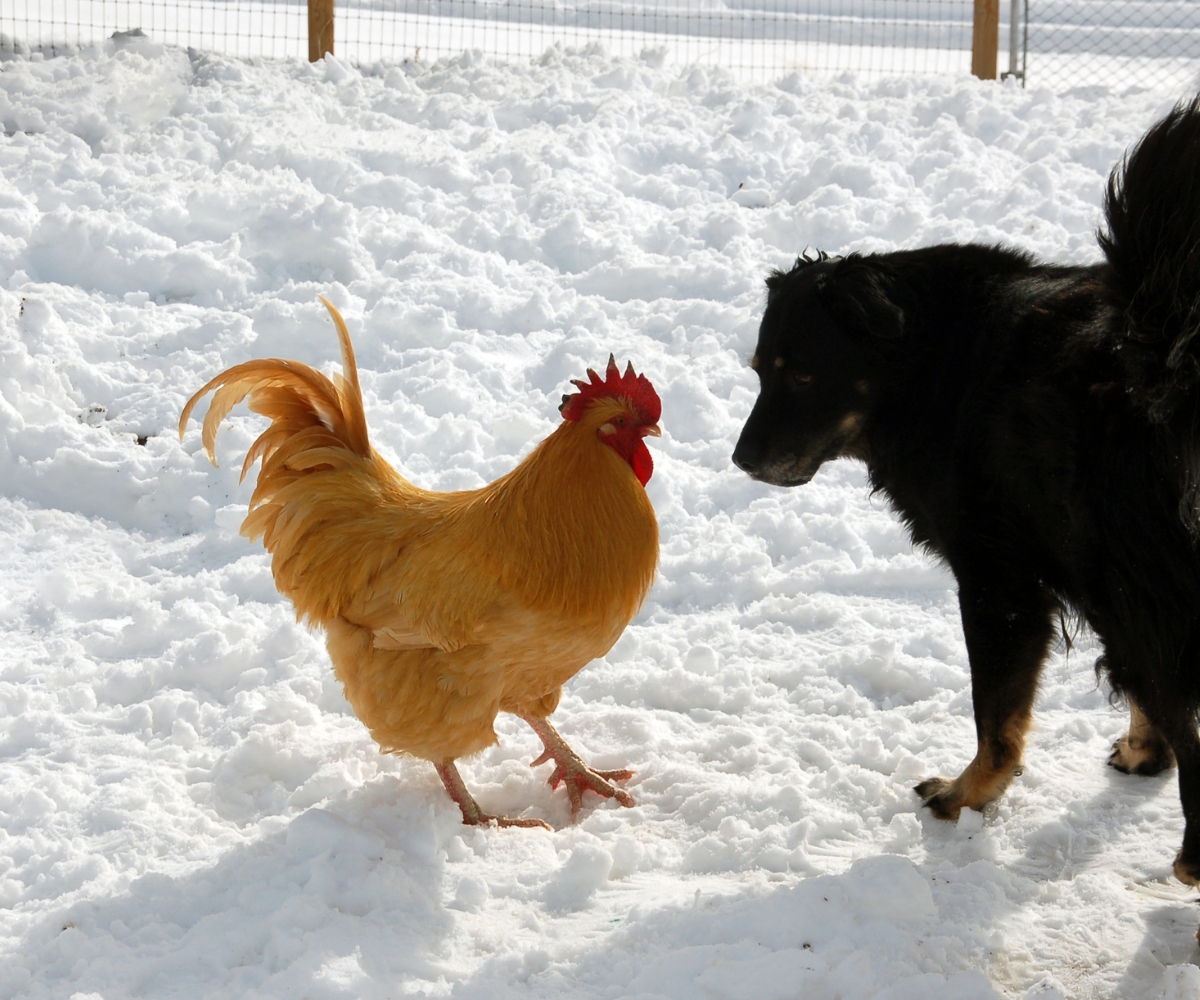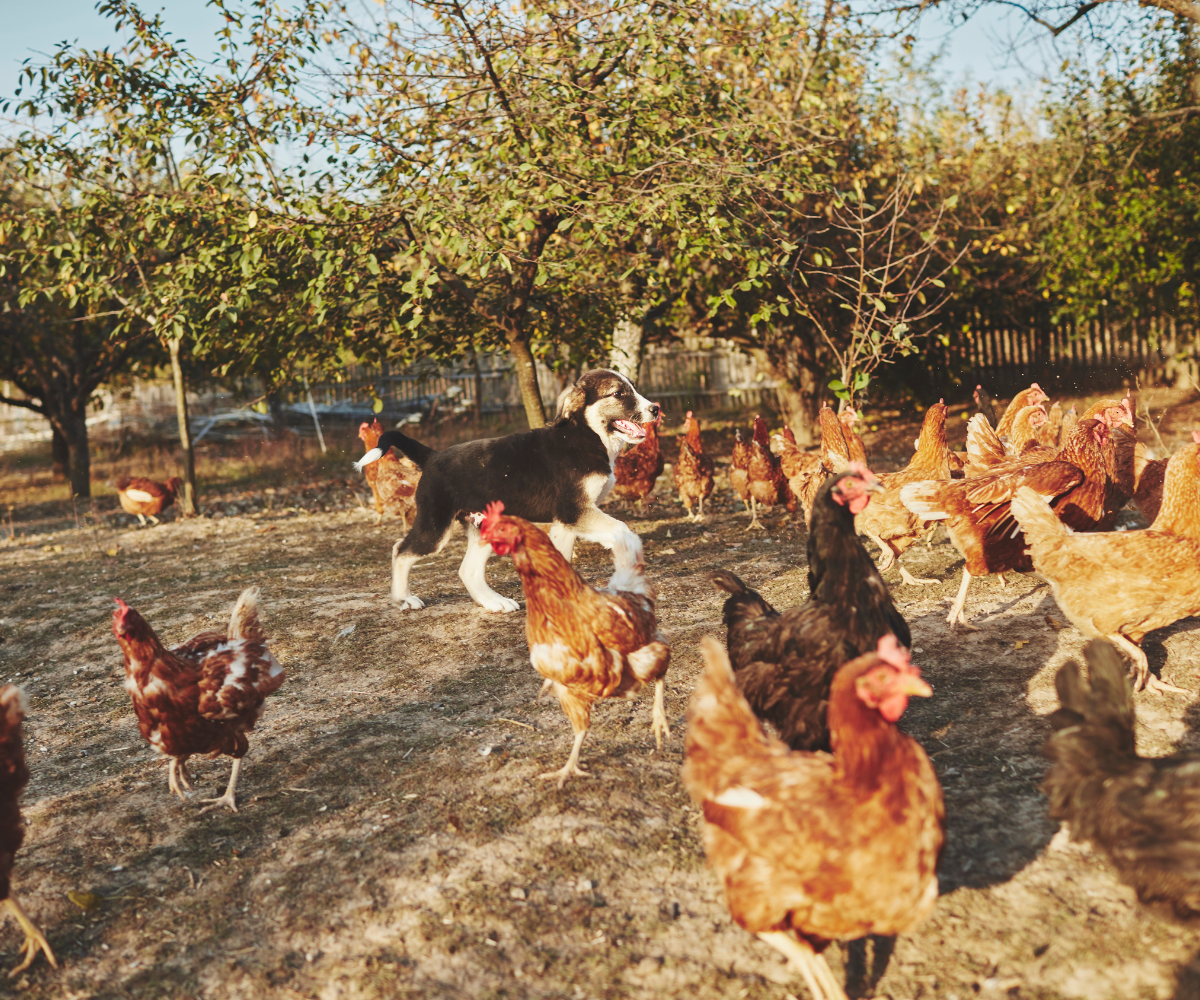The Best 8 Ways To Stop a Dog From Killing Chickens
The Best 8 Ways To Stop a Dog From Killing Chickens

Vet Reviewed

By: Sarah Hodgson
February 23, 2024
Table of Contents
Dogs are natural hunters and often have a strong prey drive, which can make them a danger to chickens. If you raise chickens, it is important to take steps to protect them from your dog, whether they are a puppy or an adult. Fortunately, there are several effective strategies for stopping a dog from killing chickens, ranging from training and deterrents to separating your dog from the chickens.
Let's dive in!
Understanding Your Dog's Behavior
Dogs are known to be great companions and loyal pets to humans. However, they are still animals with instincts that can sometimes lead to undesirable behavior. One of these behaviors includes killing chickens. In this section, we will discuss the reasons why dogs kill chickens and how to identify aggressive behavior in your dog.

Prey Drive and Predatory Instincts
All dogs have a natural prey drive, which is the instinct to hunt and capture prey. This drive is more pronounced in some breeds such as terriers, collies, and shepherds. When a dog sees a chicken, it triggers their predatory instincts, which can result in them attacking and killing the chicken.
Why Do Dogs Kill Chickens?
There are several reasons why dogs kill chickens. One of the most common reasons is boredom. When dogs are left alone for long periods, they may become bored and start looking for something to do. Chickens are easy targets and can provide a source of entertainment for dogs.
Another reason why dogs kill chickens is due to their natural prey drive. Dogs are hunters by nature, and they have a strong instinct to chase and capture prey. Chickens are small and vulnerable, making them an easy target for dogs.
Identifying Aggressive Behavior
It is essential to identify aggressive behavior in your dog to prevent them from killing chickens. Some signs of aggression include growling, snarling, lunging, and biting. If your dog displays any of these behaviors towards chickens, it is crucial to take action immediately.
One way to train your dog to stop killing chickens is by teaching them basic obedience commands such as "leave it" or "drop it." Additionally, desensitization and counterconditioning techniques can gradually acclimate dogs to the presence of chickens without triggering their predatory instincts.
8 Ways to Break a Dog from Killing Chickens
Dogs are natural predators, and their prey drive can be triggered by chickens. However, it is possible to train a dog to coexist peacefully with chickens. Here are eight ways to break a dog from killing chickens:
1. Using Deterrents
Deterrents are an effective way to discourage dogs from approaching chickens. There are several types of deterrents that can be used to keep dogs away from chickens.
- One effective deterrent is a motion-activated sprinkler system. These sprinklers can be set up around the perimeter of the chicken coop and will spray water when a dog approaches. This can startle the dog and make them think twice about approaching the chickens again.
- Another effective deterrent is a sonic device that emits a high-pitched sound that is unpleasant to dogs. These devices can be placed around the perimeter of the chicken coop and will emit a sound when a dog approaches. This can also startle the dog and make them think twice about approaching the chickens again.
Physical barriers can also be used as deterrents. Fencing can be used to create a barrier between the dog and the chickens. Electric fencing can be particularly effective as it can deliver a shock to the dog when they approach the fence. This can train the dog to stay away from the chickens.
Note
It is important to note that deterrents should be used in conjunction with other measures, such as training and supervision. Deterrents alone may not be enough to stop a dog from killing chickens. However, they can be a useful tool in preventing dogs from approaching chickens and can help to keep chickens safe.
2. Keep Your Dog Separated from the Chickens
The most straightforward way to prevent a dog from killing chickens is to keep them separated. This is especially important if your dog has a high prey drive and tends to chase after small animals.
There are several ways to keep your dog away from your chickens:
- Use a fence: A physical or electric fence can create a barrier between your dog and chickens. Make sure the fence is tall enough to prevent your dog from jumping over it.
- Create a separate area: If you have enough space, you can create a separate area for your dog and chickens. This will give your dog enough room to roam around without bothering the chickens.
- Supervise your dog: If you don't have a fence or a separate area, you can supervise your dog while they are outside. This means keeping a close eye on them and making sure they don't get too close to the chickens.
It's important to remember that not every breed of dog is a friend to feathered animals. Some breeds, such as terriers and hounds, have a strong prey drive and may be more likely to attack chickens. If your dog falls into this category, it's best to keep them separated from your chickens altogether.
By keeping your dog separated from your chickens, you can ensure the safety of both your dog and your chickens. It may take some effort to set up a separate area or install a fence, but it's worth it in the long run.
3. Training Your Dog

Training your dog is an essential aspect of preventing them from killing chickens. Here are some training techniques that can be used to train your dog to coexist peacefully with your chickens.
Obedience Training Fundamentals
Training your dog to obey basic obedience commands such as "sit," "stay," "come," and "leave it" is a crucial step in preventing them from attacking chickens. Consistency and patience are key when training your dog, especially if they are an older dog or a family dog.
Positive reinforcement is an effective training technique that involves rewarding your dog for good behavior. Praising and rewarding your dog for positive interactions with the chickens can help reinforce good behavior.
Desensitization Strategies
Desensitization involves gradually exposing your dog to the chickens in a controlled environment. This technique can be used to reduce your dog's natural instincts to chase and attack chickens. Start by allowing your dog to observe the chickens from a distance and gradually move closer over time.
It's important to remember that training your dog to coexist peacefully with chickens takes time and effort. Using a combination of obedience training, positive reinforcement, and desensitization strategies can help prevent your dog from killing chickens.
4. Protecting Your Chickens
Protecting your flock from predators is one of the most important tasks when raising chickens, especially when it comes to dogs. Here are some effective ways to protect your chickens from dogs:
The first step in protecting your chickens from dogs is to ensure that their coop is secure. Make sure the coop has sturdy fencing that dogs cannot easily break through or dig under. Additionally, consider installing a roof or wire mesh covering over the coop to prevent dogs from jumping or reaching in. A well-built coop will not only keep your chickens safe from dogs but also from other predators such as foxes and raccoons.
If you want to let your chickens free-range, it's important to create a safe chicken run. A chicken run is a fenced-in area where your chickens can roam freely without the risk of being attacked by dogs or other predators. Make sure the chicken run is completely enclosed with sturdy fencing and that there are no gaps or holes that dogs can squeeze through. You can also consider using motion-activated sprinklers to deter dogs from entering the chicken run.
5. Stop and Pull Method
The Stop and Pull Method is one of the most commonly used techniques for training dogs to stop attacking chickens. This method involves using a harness and leash to control the dog's movements and gradually introducing the dog to the chickens.
- To start with, the chickens should be kept in their coop while the dog is on a leash. The owner should slowly approach the coop with the dog, stopping when the dog begins to show signs of aggression. At this point, the owner should firmly say "NO" and pull the dog away from the coop.
- This process should be repeated several times a day until the dog learns that attacking the chickens is not acceptable behavior. The dog should be praised and rewarded for good behavior, such as sitting calmly near the chickens without showing aggression.
It is important to note that this method may not work for all dogs, especially those with a high prey drive. It is also important to never leave the dog unsupervised around the chickens, even after successful training.
6. Redirecting Attention
Redirecting a dog's attention is a great way to stop them from killing chickens. This method involves distracting the dog from the chickens and redirecting their focus onto something else. Here are a few techniques for redirecting a dog's attention:
- Toys and Treats: Keep some toys or treats handy and use them to redirect the dog's attention from the chickens. When the dog starts to show interest in the chickens, use a toy or treat to get their attention and redirect them to another activity.
- Training: Training your dog to respond to commands can be helpful in redirecting their attention. Teach your dog commands like "sit" and "stay" and use them to redirect their attention when they start to show interest in the chickens.
- Physical Distractions: If your dog is fixated on the chickens, try using physical distractions to redirect their attention. For example, you could throw a ball or a frisbee to get their attention and redirect them to another activity.
- Positive Reinforcement: Positive reinforcement can be a great way to redirect a dog's attention. When your dog is doing something other than killing chickens, reward them with treats or praise to reinforce that behavior.
- Environmental Changes: Changing the environment can also be helpful in redirecting a dog's attention. For example, you could move the chickens to a different location or create a barrier between the dog and the chickens.
- Supervision: Finally, supervising your dog can be an effective way to redirect their attention. Keep an eye on your dog when they are around the chickens and intervene if necessary to redirect their attention to something else.
By using these techniques, you can redirect your dog's attention and prevent them from killing chickens. Remember, consistency is key when it comes to training your dog, so be patient and persistent in your efforts to redirect their attention.

7. Gradual exposure, rewards
Gradual exposure and rewards can be an effective way to train dogs to stop killing chickens. This technique involves gradually exposing dogs to chickens in a controlled environment and rewarding calm, non-aggressive behavior.
The process begins with the dog being introduced to a chicken in a controlled environment, such as a fenced area. The dog is then rewarded for calm behavior, such as sitting or lying down, while in the presence of the chicken. The chicken is then moved closer to the dog, and the process is repeated until the dog is comfortable with the chicken in close proximity.
In addition to rewards for calm behavior, it is also important to use the stop and pull method if the dog becomes too excited or aggressive towards the chicken. This involves stopping the dog's behavior by pulling them away from the chicken and redirecting their attention to a toy or treat.
8. Reach Out for Professional Help
If the dog continues to kill chickens despite all the efforts of the owner, it may be time to reach out for professional help. A professional dog trainer or behaviorist can help identify the root cause of the behavior and develop a customized training plan to address it.
A professional may recommend using deterrents such as motion-activated sprinklers or loud noises to discourage the dog from approaching the chickens. Additionally, they may suggest implementing physical barriers such as fencing or netting to keep the dog away from the chickens.
Note
It is important to note that professional help can be expensive, but it may be necessary in some cases to ensure the safety of the chickens and the dog. The owner should do their research and find a reputable professional with experience in dealing with this specific behavior.
Choosing the Right Dog Breed
When it comes to keeping chickens and dogs together, choosing the right dog breed is crucial. Some dog breeds have a lower prey drive and are less likely to harm chickens, while others have a high prey drive and are more likely to see chickens as prey. In this section, we will discuss the different dog breeds and their prey drive to help you choose the right dog for your chicken coop.
Breeds with Low Prey Drive
Some dog breeds have a low prey drive and are less likely to harm chickens. These dog breeds are usually family dogs and are great with children. Some examples of dog breeds with a low prey drive include retrievers, collies, and shepherds. These dogs were bred to work with livestock and have a natural instinct to protect them.
Avoiding High-Risk Breeds
On the other hand, some dog breeds have a high prey drive and are more likely to see chickens as prey. These dog breeds include terriers, komondor, and Anatolian shepherds. If you have a high-risk breed, it's best to keep them away from your chickens altogether.
Which Dog Breeds Kill Chickens the Most?
It's important to note that not all dogs of a particular breed will have a high or low prey drive. However, some dog breeds are more likely to kill chickens than others. According to research, the dog breeds that are most likely to kill chickens include huskies, pit bulls, and rottweilers. If you have one of these dog breeds, it's important to train them properly and supervise them when they are around your chickens.
Top dog chicken killer breeds.
1. Husky
2. Great Pyrenees
3. German Shepherd
4. Labrador Retriever
5. Australian Shepherd
6. Border Collie
7. Jack Russell Terrier
8. Shiba Inu
9. Dalmatian
10. Boxer
The Bottom Line
Stopping a dog from killing chickens can be a challenging task, but with the right approach, it is possible. Here are some key takeaways to keep in mind:
- Prevention is key: The best way to stop a dog from killing chickens is to prevent the behavior from occurring in the first place. This can be done by keeping the dog and chickens separated, or by training the dog to coexist peacefully with the chickens.
- Training is essential: Training is a crucial part of preventing a dog from killing chickens. Desensitization training can help the dog learn to ignore the chickens, while positive reinforcement can encourage good behavior.
- Breed matters: Some dog breeds are more prone to killing chickens than others. It is important to understand your dog's breed and temperament, and to work with a professional trainer if necessary.
- Legal considerations: In some areas, it may be legal to use lethal force to protect livestock from a dog attack. It is important to know your rights as a livestock owner and to take appropriate measures to protect your chickens.
Overall, stopping a dog from killing chickens requires patience, consistency, and a willingness to work with your dog. With the right approach, it is possible to train your dog to coexist peacefully with your feathered friends.
Frequently Asked Questions
What steps should I take if my dog has killed a chicken?
If your dog has killed a chicken, it is important to remove the chicken's remains and dispose of them properly. You should also examine the area where the attack occurred to determine how your dog was able to access the chicken. If your dog has a history of killing chickens, it may be necessary to separate your dog from your chickens permanently.
Can a dog that has killed poultry be rehabilitated to prevent future incidents?
It is possible to rehabilitate a dog that has killed poultry, but it requires patience and consistency. The first step is to determine why the dog is killing chickens, and address any underlying issues. You can then work with a professional trainer to desensitize your dog to chickens and teach them appropriate behavior around them.
How can I protect my chickens from potential threats posed by my own or neighboring dogs?
To protect your chickens from potential threats posed by dogs, it is important to ensure that your chicken coop is secure and inaccessible to dogs. You can also use fencing or other physical barriers to keep dogs away from your chickens. Additionally, it is important to supervise your chickens at all times when they are outside of the coop.

Subscribe to Petfluence!
Get updates on the latest posts and more from Petfluence straight to your inbox.